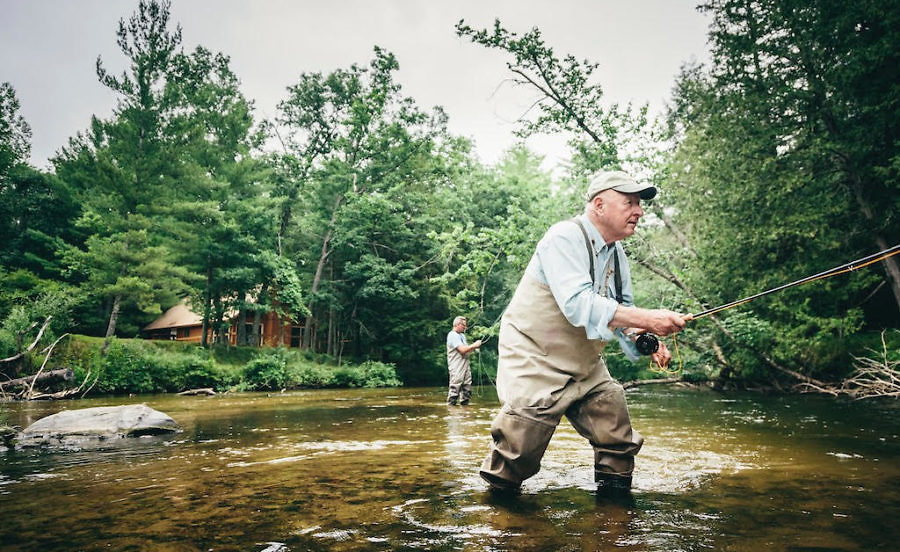
We spent the next two days exploring the upper Stone, 30 miles south of where we’d started. Access there is a bit friendlier to wading anglers, and camping more available. The Chernobyl Ant was that season’s hot fly, and the native Yellowstone cutthroats ate it in reckless spectacle. Though the grasshoppers were still abundant and midday still hot enough to bathe in the river, the hours of sunlight were shortening, the nights cooling; summer was fading. We couldn’t imagine improving on those two days, so our road trip ended there.
Within two months, Rob and his girlfriend had settled in Bozeman. I moved there less than a year later, after finding some success with women in a tropical climate and discovering that I still missed rivers, one in particular.
Rob found work at a foundry in Livingston, fabricating Western art—Charlie Russell cowboys roping steers or contemplative bison frozen in bronze.
He bought a used driftboat and learned a bit about rowing. I was waiting tables and trying my luck with mountain-town girls. I’d meet him after work for evening floats down the Yellowstone, but the relationship had changed. Now that I was a local, she began snubbing me (much like the mountain-town girls), rarely giving up anything but whitefish, sometimes not even those.
Through that fall, I can remember only one big fish, another rainbow. Like the first, it ate a dry fly and broke off quickly. An hour after I lost it, Rob misjudged a tricky mid-river wave. The bow dipped under the trough, swamping us. The stern slammed into a boulder, and the river tried to fold the boat in on itself. Six of the wooden support ribs that shored up the gunwales shattered. We braced to swim… and then the Stone let us go. Rob rowed to shore and we bailed for nearly an hour, using a soggy, cardboard beer case. After that trip, Rob refabricated the splintered ribs and sold the boat. He had a serious girlfriend at home; he didn’t need that kind of rejection.
Stay away when the spring thaw hits and she goes from cold dormancy to potent fury.
I was still smitten. Sure, she threatened my life and refused to give me any satisfaction, but that was no reason to give up. I just needed to spend more time with her, convince her that my intentions were sincere. I drove up the canyon and found some success on her upper reaches. I made friends with other boat owners, ultimately deciding that, if I was going to get serious, I needed to invest in my own boat. She tried to kill me only one other time that first year.
After a while, I started to get a better sense for her fury and affection, began learning when and where to visit and how to approach.
I stayed in Montana and, eventually, there were other romances: the Gallatin, Madison, Ruby, Missouri. Each had its own supple bends and dark, hidden places. Each had to be wooed in different ways. Five years later, I started guiding. Fittingly, my first guide day in Montana was on the Yellowstone.
I’ve now guided all over the state and fished many places around the world, but Montana is still home and the Yellowstone still my first love. We have been in a relationship long enough to get past the initial stages of infatuation and disillusion. Neither of us is monogamous: she has many partners, and I spend plenty of time with other rivers. She scares me sometimes, but hasn’t tried to drown me in over a decade.
I know when to leave her alone: Stay away when the spring thaw hits and she goes from cold dormancy to potent fury. Don’t go knocking for her during the heat of August when high water temperatures and low dissolved-oxygen levels push her into torpor.
I also know when to come around. Almost every July I am reminded exactly why she’s my first love. The cottonwoods and hayfields glow; the hawks, eagles, and ospreys return; the aquatic insects, so long dormant, stretch out in a parade of caddis, golden stones, salmonflies, drakes, yellow sallies. The trout gorge, some of them big rainbows.
Of course, I realize this is anthropomorphism. I know a river cannot reciprocate love, but romance is felt rather than constructed. It’s faster than logic. On hot summer days, I swim at lunch, and when I dive into that cold, fertile flow and kick into the current, I can almost convince myself our love is mutual.
Miles Nolte is on the Yellowstone River almost every summer day depending on the snowpack, river flow, and water temperature.
